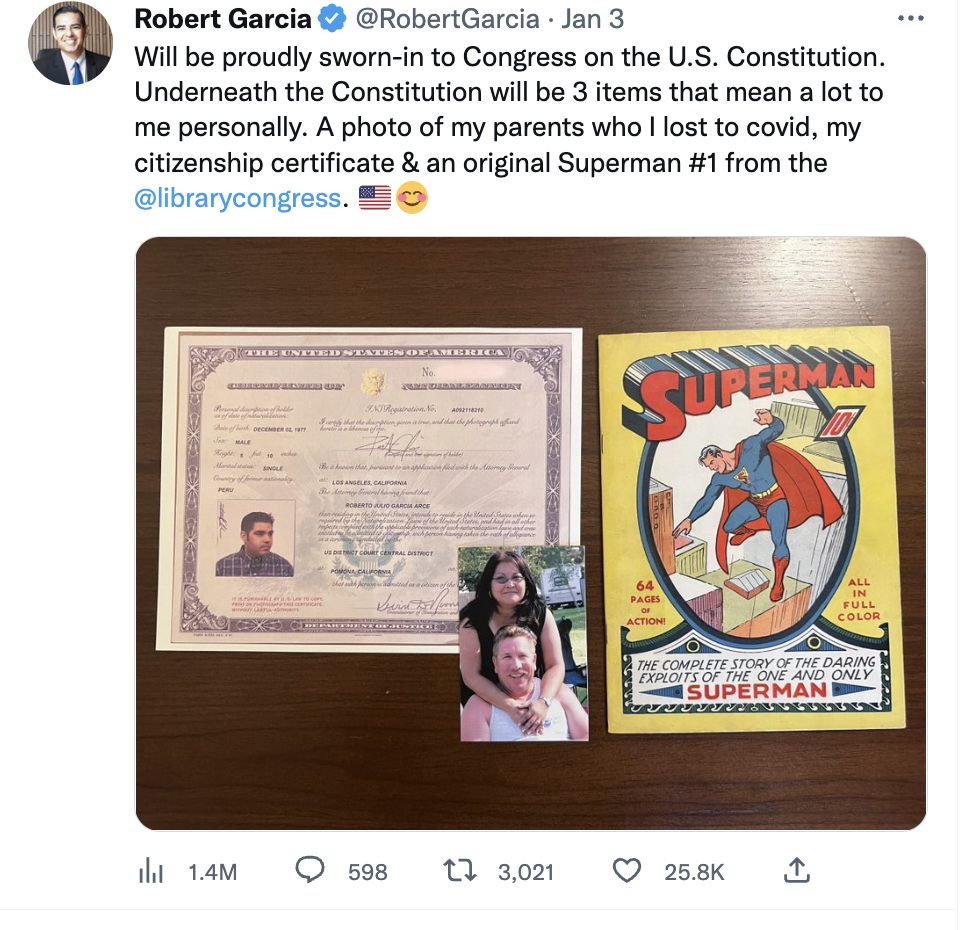
What a tonic to see newly-elected U.S. Rep. Robert Garcia vow to take his oath of office on the U.S. Constitution, not a bible.
Garcia tweeted: “Will be proudly sworn-in to Congress on the U.S. Constitution. Underneath the Constitution will be 3 items that mean a lot to me personally. A photo of my parents who I lost to covid, my citizenship certificate & an original Superman #1 from the @librarycongress.”
Cheers to Garcia for announcing he’ll be making his inauguration both meaningful and secular (whenever that happens, due to the House GOP impasse). Let’s hope he starts a trend. But according to the latest figures on the religious makeup of the new Congress, that seems dubious.
Pew reveals that Congress has a much higher percentage of Christians than is found in America at large. Those of us who are religiously unaffiliated are the real losers in terms of representation.
Christians, who comprise 63 percent of the population today, make up a whopping 88 percent of the voting members of the 118th Congress. As Religion News Service points out, that number has scarcely changed since the 1970s, while today almost a third of Americans identify as atheist, agnostic or “nothing in particular.”
CQ Roll Call, which did the analysis for Pew, finds that only Sen. Krysten Sinema calls herself religiously unaffiliated. However, this is splitting hairs. Rep. Jared Huffman, co-chair of the Congressional Freethought Caucus, wasn’t on the list of religiously unaffiliated because he identifies as a “humanist.” Yet he openly calls himself nonreligious, and in a welcoming video to FFRF’s 2022 convention, said outright that he “doesn’t believe in God.”
There’s some hope in the fact that 20 members of Congress listed no known religious affiliation. The bad news is that Rep. George Santos was weirdly placed in this category after claiming he was Jewish, but now, after embarrassing revelations, is calling himself “Jew-ish.”
One could take solace in the fact that the current number of Christians in Congress at 469 is the lowest since Pew began analyzing its religious affiliation. Unfortunately, that’s very close to the highest number of Christians, which was 500 back in 1970. Of the 534 members of Congress, 303 are Protestants (including 67 Baptist), 148 Catholic (making up 28 percent of Congress, but only 21 percent of Americans), nine Mormon, eight Orthodox Christian, 33 Jewish, three Muslim, two Hindu and three Unitarian Universalist. Then there’s the one Messianic Jew who also identifies as Christian. (What would make a truly interesting survey would be to gauge how many in Congress today are Christian nationalists, if not in name, like Marjorie Taylor Greene, than by deed.)
In an ideal secular republic, it shouldn’t matter what personal views are held by citizens or by elected representatives. For example, Garcia, who is wonderfully taking his oath of office on the Constitution, identifies formally as Catholic. Of the 16 members of the Congressional Freethought Caucus, only Huffman is “out” as a nonbeliever. Religious individuals can and do support the separation between state and church.
But is it too much to ask that the House of Representatives be representative? In the reality of today, with our bitterly divided union, the disproportionate representation of Christians depressingly signals that secular values will be suppressed, if not attacked.
There is so much at stake: the right to abortion and birth control, the rights of women, of LGBTQ+ individuals. Promoting science and fighting climate change. The Supreme Court, overseen by an arch-conservative Catholic male majority, is broken, yet this Congress hardly seems likely to fix the court.
Yet how long can Congress and the courts ignore the changing demographics? Associated Press, citing the 22 percent of voters in the midterms who claimed no religion, put it this way: “Nonreligious voters wield clout.” Congress ignores and fails to represent the “Nones” at its political peril.

